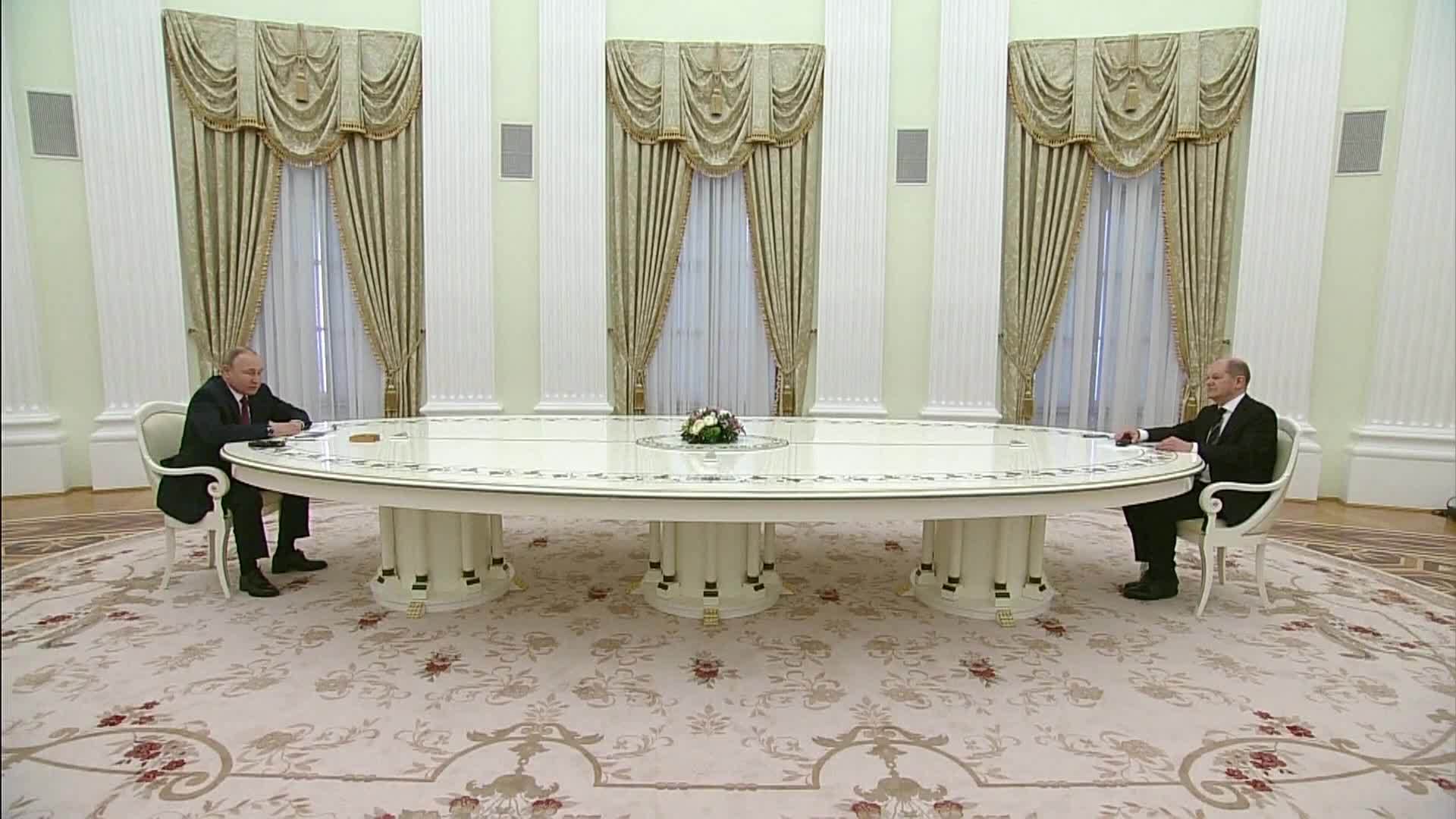Putin, Scholz hold talks on energy, Ukraine crisis
At the height of tensions between Russia and the West, the leaders of Moscow and Berlin sit down and talk over the wide array of issues between them.
-

Russian President Vladimir Putin and German Chancellor Olaf Scholz in Moscow, February 15, 2022
Russian President Vladimir Putin and German Chancellor Olaf Scholz met in the Russian capital Tuesday as Moscow announced that its troops had begun withdrawing from the Ukrainian borders.
Putin said the talks were businesslike, adding that they discussed all Western-Russian issues in detail, including the Iran nuclear deal, energy, NATO's eastward expansion, and several other key issues between the two parties.
Following the talks, the German leader said the two parties did not "mi[ss] a single topic that exists today in the relations between our countries, European relations, international relations."
One of the main Russian concerns, which Putin brought to the table, was Moscow's proposals on security guarantees, which his country expected from the United States and NATO during the bilat with Berlin.
"Naturally, we exchanged our most sincere opinions on the situation around Russian initiatives and proposals for the US and NATO to give Russia long-term, legally-binding security guarantees," Putin told a news conference in Moscow.
Rather than responding to Russia's proposals in a serious manner, the West responded in a way that the Kremlin saw as "not satisfying", and Putin commented on the response by saying the containment of Russia by force was a threat to the country's national security.
"Containment of Russia by force is perceived by us as a direct and immediate threat to national security, and legal agreements based on our proposals needed to remove this [threat]," Putin added.
NATO, EU disagree with Russia's proposals
NATO and the European Union do not agree with Russia's proposals on security guarantees, but here are points that could be discussed, the German Chancellor said.
"The proposals that were formulated by Russia — we also do not agree with them, NATO and the EU do not agree, but they also contain points that we are ready to talk about and which we are ready to discuss. Now it is necessary that a dangerous situation does not arise," Scholz highlighted.
He also told Putin the alliance was not planning on accepting new members soon in response to Moscow demanding that it stop its eastward expansion.
Putin saw that postponing Kiev's accession to NATO would not change anything, saying the issue needed to be resolved immediately.
"We hear that Ukraine is not ready to join NATO today... And they also say that they won't accept it [Ukraine] tomorrow. And will they accept it when it is prepared for this?"
NATO is "near our home," Putin stressed, noting that the security proposals were made to avert war, which Scholz said was "unimaginable," urging to make sure it remains so in the future.
Chancellor Scholz said his generation could not imagine a war in Europe. Putin said he belonged to the same generation, which witnessed NATO bombing Serbia in 1999 in what was then Yugoslavia, calling it a "very bad example."
Minsk agreements
Another national security threat of Russia is the Ukrainian violation of the Minsk accords, which Putin hoped France and Germany would influence Ukraine to comply with the agreement.
"And we very much hope that our partners both overseas and in Europe, primarily the Federal Republic [of Germany] and France, will have a relevant influence on the current Kiev authorities, and this solution will be found," Putin added.
Olaf responded by asserting that all sides of the Ukraine conflict need to comply with the Minsk agreements.
Upon being asked if Ukraine's Zelensky planned on complying with the accords, he said, "Everyone should comply with them."
President Zelensky promised all the bills on the status of Donbas and changes to the Ukrainian constitution would be discussed within the framework of the contact group, according to Scholz.
This comes after the Russian State Duma voted in favor of a draft resolution recognizing the Lugansk and Donetsk republics and the independence of Donbas.
Berlin saw the decision as a "violation of the Minsk agreements", with Chancellor Scholz saying: "If the parliament accepts what was proposed and if it becomes a reality, of course, this will mean a violation of the Minsk agreements."
"This will mean that the process will be interrupted and this will be a political disaster," he added.
Nord Stream 2
Russian President Vladimir Putin denied on Tuesday that the Nord Stream 2 gas line to Germany was a political project, saying Russian gas exports were guided by nothing but commercial interests.
"I have repeatedly said that this project is purely commercial in nature, without any political overtones," Putin told a news conference in Moscow.
Earlier in the day, however, Germany announced that it would become less reliant on Russian gas, opting out for liquefied natural gas.
"In 2021, 50.7 billion cubic meters of Russian gas was shipped to Germany. Notice that we continued supplying German consumers with fuel at fixed long-term prices even as gas prices at exchange markets rose and supply to Europe shrunk," Putin added.

 5 Min Read
5 Min Read











